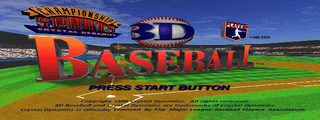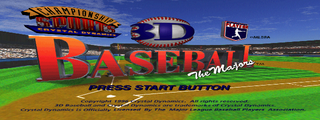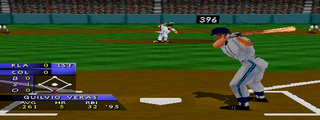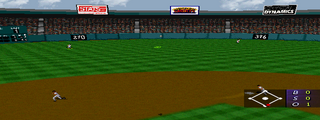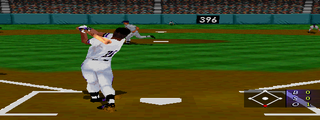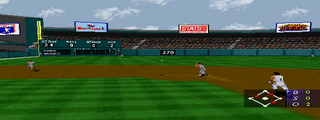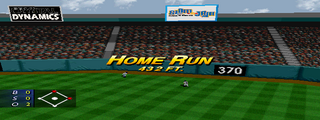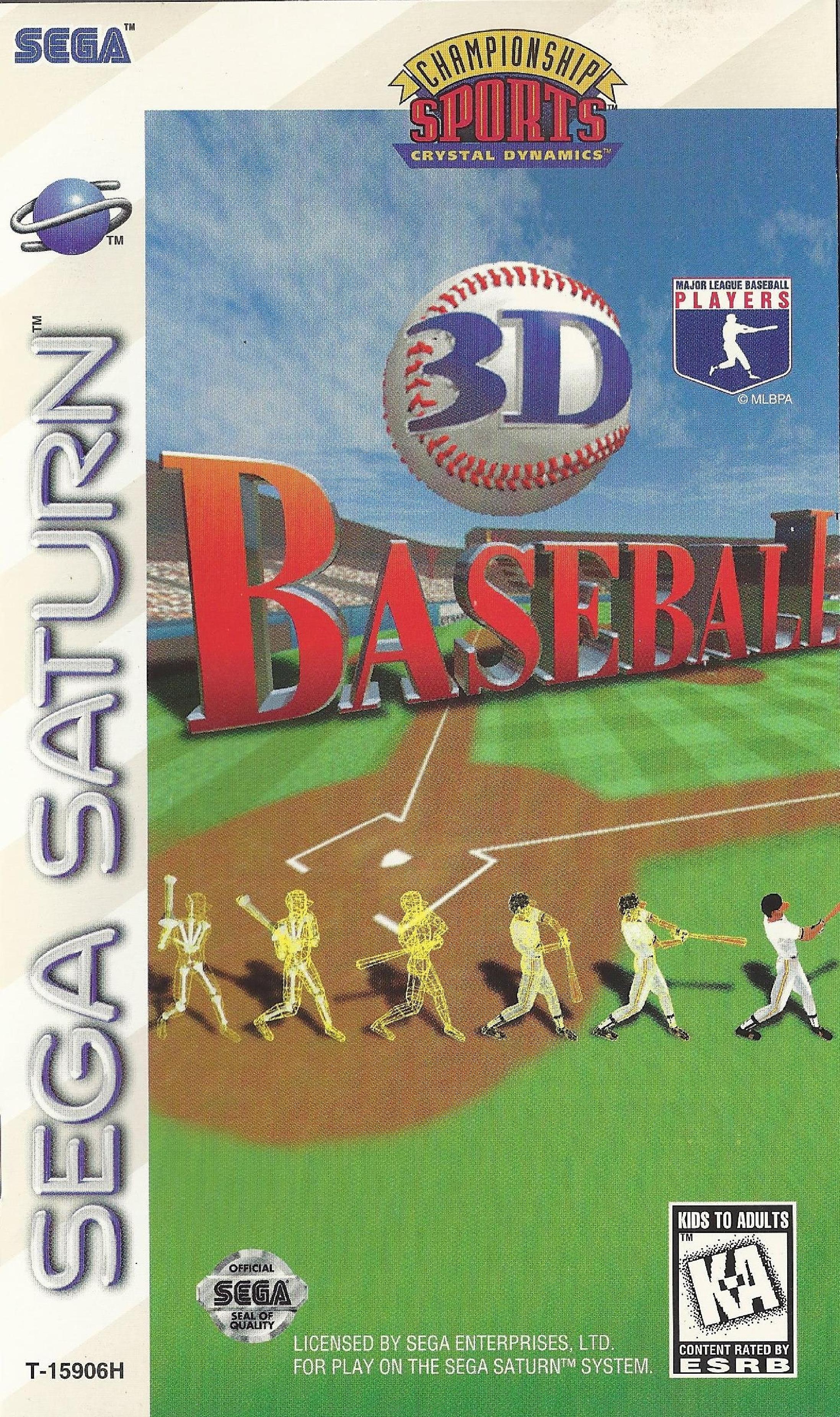3D Baseball
From Sega Retro
| |||||||||||||||
| 3D Baseball | |||||||||||||||
|---|---|---|---|---|---|---|---|---|---|---|---|---|---|---|---|
| System(s): Sega Saturn | |||||||||||||||
| Publisher: Crystal Dynamics (US), BMG Japan (Japan) | |||||||||||||||
| Developer: Crystal Dynamics | |||||||||||||||
| Supporting companies: STATS (statistics), Webtone (music), BioVision (motion capture) | |||||||||||||||
| Distributor: Mindscape (US) | |||||||||||||||
| Licensor: Major League Baseball Players Association | |||||||||||||||
| Sound driver: SCSP (1 track) | |||||||||||||||
| Peripherals supported: Saturn Backup Memory | |||||||||||||||
| Genre: Sports[1][2] (baseball) | |||||||||||||||
| Number of players: 1-2 | |||||||||||||||
| |||||||||||||||
|
3D Baseball, called 3D Baseball: The Majors (3Dベースボール ザ・メジャー) in Japan, is a 1997 baseball game for the Sega Saturn by Crystal Dynamics. During development it was known as 3D Baseball '95, before missing its 1995 launch date.
As the name suggests, the game renders the players and environment with 3D polygons, with player animations captured using motion capture (including 50 unique batting stances). It features CNN sportscaster Van Earl Wright as the announcer.
Contents
Gameplay
The game is an MLB baseball game. It has an MLBPA license, so the players are represented with their names, statistics, and portraits. Rosters are from the 1996 MLB season but player statistics are from the 1995 MLB season, so players who did not play in the 1995 season have no statistics by default. Team names and logos are not licensed, so teams are only identified by locale, and the game includes only four fictional stadiums (Crystal Yards, Burton Park, the Stadium, and Willis Field).
Before a game, players can change the batting line-up and pick a starting pitcher. During gameplay, the default view for pitching and batting is from behind the batter, but the player can cycle the view by pressing ![]() . Views include higher or lower views from behind the batter or a view from behind the pitcher. The player can toggle the score and inning and the statistics of the current batter by pressing
. Views include higher or lower views from behind the batter or a view from behind the pitcher. The player can toggle the score and inning and the statistics of the current batter by pressing ![]() .
.
In the game options, players can select automatic or manual fielding (whether the game automatically moves the player's fielders when a ball is hit), toggle errors (whether fielders sometimes make mistakes, to increase the realism of the game), and toggle the spoken commentary.
Modes
There are two main modes:
- Exhibition Game: A single game between one player and a computer player, two players, or two computer players (in a demo mode). Players can choose any team (which can be the same team) and any stadium and can optionally use the roster from the Pennant Race mode (including any trades that the player has made). There is a toggle for the Ten Run Rule, which ends the game early if a team is winning by 10 or more runs by the bottom of the fourth inning. Players can enter the General Manager menu before the game to alter player stats or make trades.
- Pennant Race: A season of 26, 81, or 162 games, played by one player. Progress is saved to the Saturn's internal memory so the season can be continued later. The player selects a team and a home stadium. Season games are scheduled on a calendar. There is a General Manager menu that allows the player to alter players stats or make trades.
Teams
In addition to these teams, the American League All-Stars and the National League All-Stars are available to play in exhibition games.
| Team | Based on |
|---|---|
| Atlanta | Atlanta Braves |
| Baltimore | Baltimore Orioles |
| Boston | Boston Red Sox |
| California | California Angels |
| Chicago (A) | Chicago White Sox |
| Chicago (N) | Chicago Cubs |
| Cincinnati | Cincinnati Reds |
| Cleveland | Cleveland Indians |
| Colorado | Colorado Rockies |
| Detroit | Detroit Tigers |
| Florida | Florida Marlins |
| Houston | Houston Astros |
| Kansas City | Kansas City Royals |
| Los Angeles | Los Angeles Dodgers |
| Milwaukee | Milwaukee Brewers |
| Minnesota | Minnesota Twins |
| Montreal | Montreal Expos |
| New York (A) | New York Yankees |
| New York (N) | New York Mets |
| Oakland | Oakland Athletics |
| Philadelphia | Philadelphia Phillies |
| Pittsburgh | Pittsburgh Pirates |
| St. Louis | St. Louis Cardinals |
| San Diego | San Diego Padres |
| San Francisco | San Francisco Giants |
| Seattle | Seattle Mariners |
| Texas | Texas Rangers |
| Toronto | Toronto Blue Jays |
Versions
Localised names
| Language | Localised Name | English Translation |
|---|---|---|
| English (US) | 3D Baseball | 3D Baseball |
| Japanese | 3Dベースボール ザ・メジャー | 3D Baseball: The Majors |
Production credits
- Lead Programmer: Bill Willis, Richard Anderson
- Lead Designer: Sam Player
- Additional Programming: Jonah Stich, Steve Timson, Charles Martin, Dan Su, Doug Ihde, Mark Burton, Sam Dicker, Jeff Kesselman, Sean Vikoren, Robin Heydon, Bob Smith, Dan Rosenfeld
- 3D Art: Chad Greene, Amy Hennig
- Art: Amy Hennig, Cynthia Hamilton, Andy Kaplan, Mike Provenza, Maj Cole, Tenaya Sims, Laura Grieve
- Additional Design: Bill Willis, Mark Burton, Richard Anderson, Andy Trapani, Riley Cooper, Lyle Hall
- Starting Producers: Dave Kirk, Andy Trapani, Lyle Hall
- Relief Producer: Bill "The Thrill" Mitchell
- Closing Producer: Jeff Lee
- Assistant Producer: Alex Ness
- Executive Producer: Jon Horsley
- PCA: Phil Lemarbre, Gene Bodio
- Windlight Studios: Pam Lehn, Ron Pitts, Shannon Gilley, Jeff Raymond
- Storyboard Art: Andy Mitchell
- Original Music Score: Webtone Productions, Greg Weber
- Intro Music: Steve Henifin
- Music Adapted for Sega Saturn™: Brian Coburn
- Audio/Video Group: Mark Miller, Dan Brazelton, Katie Weathers, Burke Trieschmann, Leland Susser
- Intro Video Production: Twenty2Product, Chad Greene
- Sound Effects: Steve Henifin, Brian Coburn, Loudmouth, Inc.
- Statistics Provider: STATS, Inc., Jim Capuano, Stefan Kretschmann, Peter Woelflein
- Player Photographs Provided by: The Upper Deck Company, Steve Babineau
- Motion Capture Data Provided by: Biovision, Ron Marchi, Dwayne Mason, Matt Wynne
- Motion Capture Actors: Paul Chiaffredo, Matt Daily, Jeff Martin, Sam Player, Jarrod Schock, Michael Wynne
- Vice President of Marketing: Scott Steinberg
- Product Marketing Managers: Chip Blundell, Jim Curry
- Public Relations: Steve Groll, Sandra Yee, Jenniffer Bulka
- Test Manager: Alex Ness
- Lead Testers: Doug Leslie, Matt Prescott
- Test: Sako Bezdjian, Eddie Ramirez, Scott Crisostomo, Billy Martorana, Mitch Giampaoli, Casey James Craig, Sean Potter, Craig Locicero, Joe Damon, Billy Mitchell, Chris Bruno, Shun Chang, Jeff Wilkinson
- Voiceover Recorded at: General Television Network, Detroit, Michigan
- Special Thanks: Madeline Canepa, Roy Cooler - MLBPA, Team Titan, Music Annex, Alpha CD
- Game Manual: Hanshaw, Ink., Sam Player
Magazine articles
- Main article: 3D Baseball/Magazine articles.
Promotional material
Artwork
Physical scans
| Sega Retro Average | ||||||||||||||||||||||||||||||||||||||||||||
|---|---|---|---|---|---|---|---|---|---|---|---|---|---|---|---|---|---|---|---|---|---|---|---|---|---|---|---|---|---|---|---|---|---|---|---|---|---|---|---|---|---|---|---|---|
|
| 59 | |
|---|---|
| Based on 8 reviews | |
Technical information
- Main article: 3D Baseball/Technical information.
External links
- Sega of America webpage: Saturn
References
- ↑ File:3DBaseball Saturn JP Box Back.jpg
- ↑ 2.0 2.1 https://sega.jp/fb/segahard/ss/soft_licensee3.html (Wayback Machine: 2019-07-28 12:30)
- ↑ http://riehlspot.simplenet.com/vgame/new/saturn.html (Wayback Machine: 1999-02-21 17:22)
- ↑ File:3dbaseball sat us manual.pdf, page 23
- ↑ GamePro, "January 1997" (US; 1997-xx-xx), page 137
- ↑ Game Informer, "December 1996" (US; 1996-1x-xx), page 71
- ↑ Intelligent Gamer, "November 1996" (US; 1996-1x-xx), page 102
- ↑ Next Generation, "December 1996" (US; 1996-11-19), page 268
- ↑ Saturn Fan, "1996 No. 26" (JP; 1996-12-13), page 202
- ↑ Saturn Fan, "1997 No. 6" (JP; 1997-03-14), page 110
- ↑ Sega Saturn Magazine, "1996-22 (1996-12-27)" (JP; 1996-12-13), page 279
- ↑ Ultra Game Players, "November 1996" (US; 1996-10-08), page 127
| 3D Baseball | |
|---|---|
|
Main page | Comparisons | Development | Magazine articles | Reception | Technical information | |
